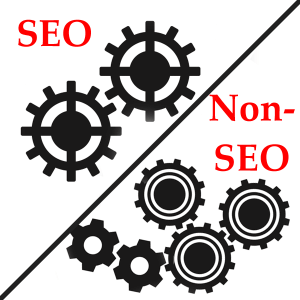Want To Future-Proof Your SEO? 6 Ethical Guidelines To Consider
Ethical SEO is a popular selling point for agencies and consultants, but what truly constitutes ethical SEO? Following are some guidelines for performing ethical SEO. By sticking to these guidelines, you’ll keep your reputation, your clients, and the search engines happy! 1. Follow The Search Engines’ Guidelines First, the obvious. Search engines have rules of […]

Following are some guidelines for performing ethical SEO. By sticking to these guidelines, you’ll keep your reputation, your clients, and the search engines happy!
1. Follow The Search Engines’ Guidelines
First, the obvious. Search engines have rules of the road. Learn them.
Webmaster guidelines include:
- Descriptions of the types of content search engines want to serve in their results
- Technical recommendations that will make it possible or easier to index a site
- Quality guidelines for content
- How to organize a website for better inclusion
- Laundry lists of optimization and promotion techniques webmasters should not use
Webmaster guidelines are not all-inclusive. There’s plenty you can do to improve ranking opportunities or incur search engine penalties that you will not see in these documents. Rather than treating these guidelines as a simple checklist, it’s vital to also appreciate and follow the spirit of the rule.
2. Focus On What Will Work

An agency or consultant can fill billable hours with lots of SEO best practices. The ethical ones focus on the ones that will improve organic search traffic.
One can optimize title elements, h# elements, alt attributes and keyword use. For a low-performing website in a competitive market, though, these on-page SEO basics are unlikely to help. It’ll probably be more effective to spend time on authority building with new, citation-worthy content and link building. Later, once the website begins enjoying some benefits from increased authority, those on-page optimization basics could help.
The point is to not follow a standardized checklist or perform the most accessible tasks first. SEO is not an E-Myth undertaking — it’s a linchpin responsibility. McDonalds is an E-Myth company. They have lots of manuals and do everything the same way every time. Search engine optimization requires understanding your client and executing on a custom project plan.
You can perform high-value activities concurrently with SEO basics and other tasks as long as each activity cycle or project sprint includes work that will generate the largest, most immediate impact.
3. Separate SEO From Non-SEO

When Google announced page speed as a ranking factor, a lot of agencies and consultants began selling page speed optimization or added it to their lists of things to do. Google made it clear page speed affected an extremely small percentage of sites, yet page speed became the cause du jour.
Suddenly agencies began wrestling with cache plug-ins and server administrators, trying to improve YSlow scores. Later, when we learned how page speed affects conversion on enterprise retail sites, search optimizers justified their efforts even though conversion optimization and search engine optimization are distinctly separate.
Yes, page speed correlates with higher search rankings. But, correlation is not causation. Perhaps brands with deep SEO resources also have great server optimization crews. Regardless, sales conversions are not an SEO ranking factor.
The ultimate goal of SEO is more visitors, conversions, sales, revenue, ROI, etc. As you work on websites you’re bound to see beneficial opportunities that have nothing to do with SEO. Share these with your clients or employers; just don’t get distracted by them. When in doubt, refer to #2. Will it impact SEO in the largest, most immediate way?
If you think a non-SEO item is critical and it’s something you can address, try to sell it as an add-on service.
4. Be Honest About Expectations

There are plenty of ways to oversell. SEO takes time, especially if you must catch up to established competitors who also optimize for search engines. I’m sure you’ve heard the saying that SEO is a cold war. It means that you must work to equal or exceed your rival’s authority, then keep working in order to stay there — all while they create more content and earn more links and citations.
It can take anywhere from six weeks to six months to create demonstrable results. Sure, sometimes you can do it faster. Other times, it will take longer. It all depends on your clients’ resources and the level of competition. If you tell a client or employer that they can earn early wins, you’d better be sure.
Another example of honest expectations is traffic estimates. Let’s say you’re doing SEO for a chain of in-state businesses. The Google Keyword Planner, limited to one state’s geography, reports 250 searches per month for a prime keyword. Assume organic gets 60% of the 250 and a #1 ranking receives 42% of the 60% — that’s 63 searches per month.
When a client invests thousands of dollars in numbers like this, it can be disheartening. It’s easy to look to other tools in search of better numbers, and you may find them. What will you report to clients? Only the most optimistic numbers you can generate?
I say show them the range. Show them the Google numbers. Show them the Bing numbers. And, show them the Wordstream, Keyword Discovery or SEMRush numbers. Whatever tools you use, give clients and employers honest projections in order to properly set expectations.
5. Don’t Exploit Unsustainable Loopholes

Apologies to SEO professionals who raise funds for causes they believe in or are deeply tied to. I know industry leaders who do admirable work on behalf of charities. At the same time, fundraising by optimizers went from near zero to ubiquitous, then disappeared when this tactic lost favor.
More recently, SEO professionals flocked to paid guest blogging services. While the pretext was to purchase professionally copyrighted content, the conveniently overlooked reality was that many writers double-dipped. They got paid to write and they were paid to insert links on behalf of employers or clients.
Stick to sustainable practices or be certain short-term efforts closely align with your client or employer’s business goals — and with the search engines’ guidelines. Just because an opportunity exists does not mean you should go there.
6. Respect Your Employees’ Values

I once asked not to work on behalf of a client that sold term papers. Fortunately, my manager understood my deep feelings about plagiarism and juggled our clients so I could work on different assignments.
Whether it’s sex toys, gambling or another hot-button issue, what may be a legitimate business to you might offend an employee. Respect them. Don’t force staff members to abandon their values.
What ethics that affect SEO matter to you? I’d love to hear about it in the comments.
Contributing authors are invited to create content for Search Engine Land and are chosen for their expertise and contribution to the search community. Our contributors work under the oversight of the editorial staff and contributions are checked for quality and relevance to our readers. The opinions they express are their own.
Related stories